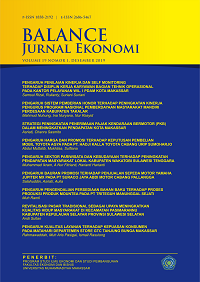Social Welfare in the Perspective of the Newspaper and Human Rights: Conceptual Study of Implementation in Orphanages
DOI: https://doi.org/10.26618/jeb.v21i1.17345
Human Rights, Welfare, Orphanages
Abstract
This conceptual study explores the integration of Qur’anic principles on human rights and social welfare with a focus on orphanages as institutions that uphold the rights and dignity of vulnerable children. By employing a qualitative approach through thematic (maudu’i) interpretation of selected Qur’anic verses, supported by hadith and scholarly literature, this study investigates the implementation of Islamic values—such as justice, compassion, and social responsibility—in the operational frameworks of orphanages in Indonesia. Findings reveal that although the Qur’an does not explicitly articulate modern legal terminology of human rights, its core teachings promote universal principles including the right to life, dignity, education, and protection for orphans and the needy. Orphanages are seen as practical embodiments of these principles, providing care, shelter, education, and emotional support. However, many face systemic challenges, including limited resources, poor management, and lack of integration with broader social programs. This study contributes to the discourse by highlighting the need for institutional reform that aligns with both Qur’anic mandates and international human rights standards. Practical recommendations include enhancing institutional capacity, improving transparency, encouraging government–civil society collaboration, and fostering community involvement. The research underscores the Qur’an’s relevance as a moral foundation for social justice and offers a holistic framework for improving the welfare of orphans through faith-based and rights-based approaches.References
Aminah, S. (2010). Human rights (HAM) in the perspective of the Qur'an. Diktum: Journal of Sharia and Law, 8(2), 161–173.
Assiba’i, M. H. (1981). Social life according to Islam: Guidance for life in society (2nd ed.). CV Diponegoro.
Astika, B. (2010). Description of the concept of well-being in the elderly in Sumbermulyo Village [Undergraduate thesis, Sanata Dharma University].
Basri, I. A. (2009). Islam and economic development. Gema Insani Press.
Bahreisy, S. (1976). Translation of Riadhus Shalihin II (2nd ed.). Al-Maarif.
Department of Education and Culture of the Republic of Indonesia. (1994). The great dictionary of the Indonesian language. Balai Pustaka.
Fairuzabadi, A. (1983). Qamus al-Muhit (Vol. 4). Dar al-Fikr.
Humphrey, E. (Ed.). (1976). Human rights declaration. In Encyclopedia International (Vol. IX, p. 36). Lexicon Publication.
Marsuni, N. S. (2024). The challenges of the sharia economy and businesses in facing the coronavirus endemic and circular economy in Indonesia. Laa Maisyir: Jurnal Ekonomi Islam, 1, 275–291.
Ministry of Religious Affairs of the Republic of Indonesia. (n.d.). [Qur’anic reference]. (Refer to official document for full citation).
Qur’an. (n.d.). Surah Al-Baqarah: Verse 177.
Qur’an. (n.d.). Surah An-Nisa: Verse 36.
Setiawan, N. K. (n.d.). The roots of progressive thought in the study of the Qur'an. eLSAQ Press.
Shihab, M. Q. (1997). Insights into the Al-Qur’an (6th ed.). Mizan.
Salim, H. M., Mardan, & Abu Bakar. (2012). Research methodology. [Publisher not stated].
Sinar Grafika Editorial. (2000). Human rights law (1st ed.). Sinar Grafika.
Sudarsono. (1999). Legal dictionary (2nd ed.). PT Rineka Cipta.
Tamaddun. (2008, December). Media for communication and education of sharia economics (Ed. XVIII), 6.
Wilonx, W. (1976). Human rights declaration. In E. Humphrey (Ed.), Encyclopedia International (Vol. IX, p. 36). Lexicon Publication.
‘Awanah, J. A. (2008). Islam upholds human rights (1st ed.). Oase Media.













